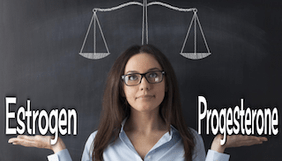The Secret Powers of Ovulation (It’s Not Just for Making a Baby)
Ovarian hormones estrogen and progesterone are highly beneficial for health. That means that natural ovulatory menstrual cycles are beneficial for health because cycling is the only way to make ovarian hormones.
Does that surprise you? Men make their valuable testosterone every day, so you might think women would do something similar, but we don’t. Instead, we make our hormones as a surge of estrogen leading up to ovulation and an even bigger surge of progesterone for the two weeks after ovulation.
It’s an elegant system that sometimes results in a baby. But even when ovulation does not result in a baby, it’s still worth doing because it delivers beneficial steroid hormones that the body absolutely expects to have.
Benefits of ovulation
Every monthly dose of estrogen promotes muscle gain, insulin sensitivity, and the long-term health of bones, brain, and the cardiovascular system.
Every monthly dose of progesterone reduces inflammation, regulates the immune system and supports thyroid, brain, bones, and breast tissue.
The benefits of ovarian hormones are both short-term (they make you feel good) and long-term (they build metabolic reserve and contribute to long-term health).
According to Canadian endocrinology professor Jerilynn Prior, “women benefit from 35 to 40 years of ovulatory cycles, not just for fertility but also to prevent osteoporosis, stroke, dementia, heart disease, and breast cancer.” In that sense, each and every ovulation is like a monthly deposit into the bank account of long-term health.
For Professor Prior, ovulatory cycles are a “creator of good health.” They’re also an “indicator of good health” because when we’re healthy, ovulation arrives smoothly and regularly. When we’re unhealthy in some way, the lack of ovulation can tell the story.
The American College of Obstetricians and Gynecologists (ACOG) agrees. In December 2015, together with the American Academy of Pediatrics, they quietly issued a groundbreaking statement called Menstruation in Girls and Adolescents: Using the Menstrual Cycle as a Vital Sign, in which they state that doctors should always ask patients about menstruation and advise girls to chart their cycles. By doing so, they say, “doctors will demonstrate to patients that menstruation is an important reflection of their overall health.”
I invite you to think about ovulation as the valuable, health-giving event that it is. I would go so far as to say that if you’re not thinking about ovulation, then you’re not thinking about health.
There are three main reasons women don’t ovulate.
Obstacles to ovulation
- Hormonal birth control
Hormonal birth control stops ovulation, which is, of course, its purpose. It shuts down ovarian function and replaces estrogen and progesterone with contraceptive drugs like ethinylestradiol and levonorgestrel which can cause hair loss and other side effects.
👉Tip: There’s no progesterone in any type of birth control.
The physiological difference between our actual hormones and the contraceptive drugs of birth control affects every system in the body. Compared to women who cycle, women who take contraceptive drugs have altered brain structure and a greater risk of depression and autoimmune disease.
- Undereating and undereating carbs
Women need food. That should be stating the obvious but in our weird culture of dieting, it somehow needs to be said. Women need food in order to be healthy and also in order to ovulate and have regular menstrual cycles.
Losing periods because of undereating is called hypothalamic amenorrhea and is not a disorder but rather a smart, adaptive decision by the brain to pause reproduction when there’s not enough food to safely make a baby. That’s true whether or not you want a baby; because that’s how the female body works.
Too little food can stop ovulation and periods; too little carbohydrate can do the same thing. It’s not because carbs are needed for health, but because (for some women), carbs are a signal from the environment that there’s enough food to make a baby.
- Polycystic ovary syndrome (PCOS)
PCOS is the situation of having excess androgens or too many male hormones. It can also have the symptoms of anovulation or lack of ovulatory cycles.
The primary driver of anovulation in PCOS is insulin resistance or high insulin which can be reversed by diet and exercise and natural supplements such as inositol.
👉Tip: Before you embark on any kind of calorie-restricted or carb-restricted diet for PCOS, take care that your diagnosis was not based solely on an ultrasound or an AMH blood test. Those tests are not reliable and may have resulted in you being told you have PCOS when you actually have hypothalamic amenorrhea. Read Maybe It’s Not PCOS.
In conclusion, ovulation is both a window into health and an important source of health and vitality.
Gloria Steinem said that if men could menstruate, menstruation “would become an enviable, worthy, masculine event: Men would brag about how long and how much.”
I would take it a step further and say that if men could only make testosterone by ovulating, then they would never stop talking about it.

